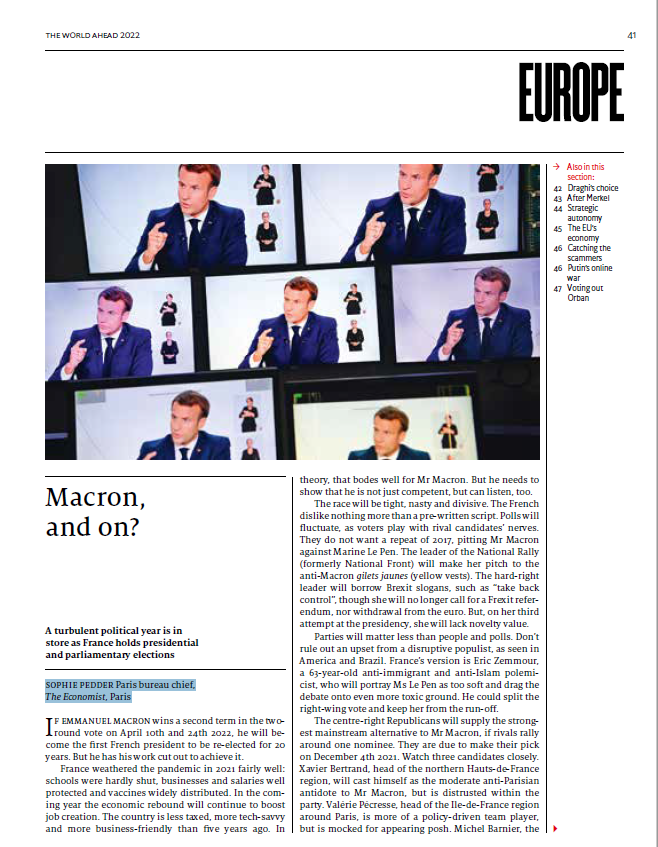A turbulent political year is in store as France holds presidential and parliamentary elections
If Emmanuel Macron wins a second term in the tworound vote on April 10th and 24th 2022, he will become the first French president to be re-elected for 20 years. But he has his work cut out to achieve it. France weathered the pandemic in 2021 fairly well: schools were hardly shut, businesses and salaries well protected and vaccines widely distributed. In the coming year the economic rebound will continue to boost job creation. The country is less taxed, more tech-savvy and more business-friendly than five years ago. In theory, that bodes well for Mr Macron. But he needs to show that he is not just competent, but can listen, too.

The race will be tight, nasty and divisive. The French dislike nothing more than a pre-written script. Polls will fluctuate, as voters play with rival candidates’ nerves. They do not want a repeat of 2017, pitting Mr Macron against Marine Le Pen. The leader of the National Rally (formerly National Front) will make her pitch to the anti-Macron gilets jaunes (yellow vests). The hard-right leader will borrow Brexit slogans, such as “take back control”, though she will no longer call for a Frexit referendum, nor withdrawal from the euro. But, on her third attempt at the presidency, she will lack novelty value.
Parties will matter less than people and polls. Don’t rule out an upset from a disruptive populist, as seen in America and Brazil. France’s version is Eric Zemmour, a 63-year-old anti-immigrant and anti-Islam polemicist, who will portray Ms Le Pen as too soft and drag the debate onto even more toxic ground. He could split the right-wing vote and keep her from the run-off.
The odds are still, just, on a Macron victory. But he would find a centre right opponent particularly tough
The centre-right Republicans will supply the strongest mainstream alternative to Mr Macron, if rivals rally around one nominee. They are due to make their pick on December 4th 2021. Watch three candidates closely. Xavier Bertrand, head of the northern Hauts-de-France region, will cast himself as the moderate anti-Parisian antidote to Mr Macron, but is distrusted within the party. Valérie Pécresse, head of the Ile-de-France region around Paris, is more of a policy-driven team player, but is mocked for appearing posh. Michel Barnier, the eu’s former Brexit negotiator, is better known in Britain than France, but liked by party members. If Mr Bertrand loses, don’t rule out a rebellious solo run for the presidency. Each will promise to “respect” the French more— a dig at Mr Macron’s reputation for arrogance.
The left’s prospects, by contrast, look slim, unless rivals can unite behind a single candidate. The Socialists’ Anne Hidalgo (mayor of Paris) and the Greens’ Yannick Jadot appeal to bicycle-riding city voters, but lack broader appeal. Candidates on the hard left, including Jean-Luc Mélenchon, will split the vote further still.
In January, France will take over the six-month presidency of the EU Council. This will put Europe at the centre of Mr Macron’s campaign. Expect him to push “European sovereignty”, as a response to a rising China and a disengaging America. Bruised by Anglophones in the Indo-Pacific, Mr Macron will be keener than ever to reinforce his country’s strategic links—and act as a dominant voice within Europe in the post-Merkel era.
The odds are still, just, on a Macron victory. But he would find a centre right opponent particularly tough. Even if he wins, he may struggle for a majority at parliamentary elections in June. He will need help from Edouard Philippe, his ex-prime minister, who will use his new party, Horizons, to win seats and clout. A new government will try to curb public spending after the runaway budgets of the pandemic, and to raise the retirement age. This will prompt angry protests and strikes. Even if re-elected, Mr Macron will struggle to repair divisions after a febrile and turbulent year.
Sophie Pedder Paris bureau chief, The Economist, Paris